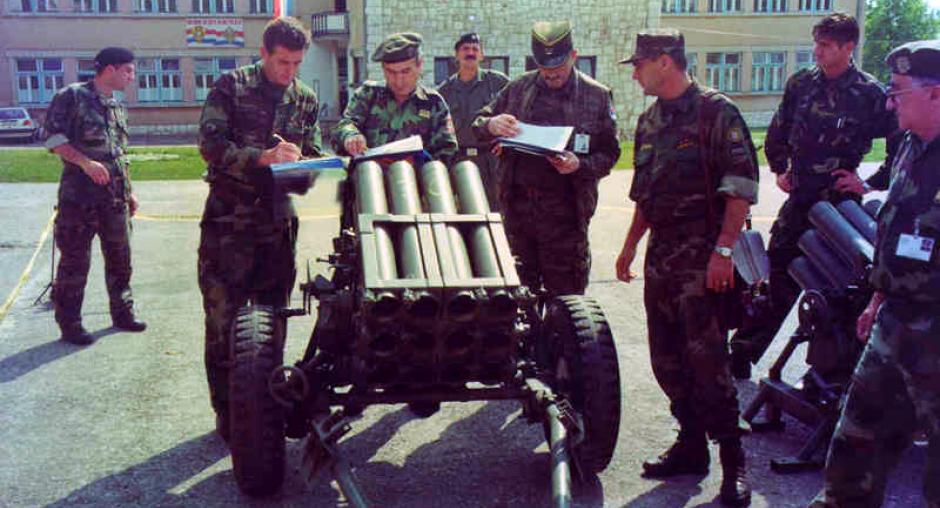Newsroom
Successful conclusion of Article V negotiations finalize remaining component of Dayton/Paris Peace Accords
VIENNA 18 July 2001

Arms control inspections are a part of the confidence- and security-building measures agreed in the Dayton Peace Accords. (OSCE) Photo details
VIENNA, 18 July 2001 (OSCE) - Today, twenty participating States reached consensus on a document, which finalizes the single remaining aspect of the Dayton Peace Accords. The consensus was reached on a Concluding Document of the Article V negotiations, which provides for security and stability "in and around the former Yugoslavia". It was the last of three instruments that the Dayton/Paris Peace Accords - officially called the General Framework Agreement for Peace in Bosnia and Herzegovina, signed in December 1995 - mandated the OSCE to elaborate and implement.
The first, Article II, provided the framework for negotiations of an agreement on Confidence- and Security-Building Measures in Bosnia and Herzegovina. The second, Article IV, provided the framework for negotiations of sub-regional arms control agreement. Both Articles II and IV were concluded in 1996 and are being implemented.
According to Ambassador Henry Jacolin, Special Representative for the Article V negotiations, "the negotiations were long and sometimes very difficult, but with the political will and flexibility of all participating States they were able to be brought to a successful conclusion".
The Article V negotiations have yielded a document called Concluding Document of the Negotiations under Article V of Annex 1-B of the General Framework Agreement for Peace in Bosnia and Herzegovina. The Document contains a list of voluntary Confidence- and Security-Building Measures that will mainly build on those found in the Vienna Document 1999. These are tailored to regional requirements and can be considered an augmented catalogue of guidelines, which the participating States can utilize in accordance with their own respective national security requirements. Such voluntary measures as increased military contacts and joint training are included in the document. It reflects the changes in the security situation in the region. A commission is also formed to review the implementation of these measures. The measures are expected to go into effect on 1 January 2002.
The Article V negotiations began in early 1999 under Ambassador Henry Jacolin of France, and have continued until the present. The aim of the Article V negotiations was to devise measures to enhance stability as a whole within the region. The negotiations were hampered by the suspension of the negotiations during the Kosovo Crisis. However, the admission of Yugoslavia to the OSCE in October 2000, paved the way for successful conclusion of the negotiations.
The twenty participating States are: Albania, Germany, the United States of America, Austria, Bosnia and Herzegovina, Bulgaria, Croatia, Spain, France, the United Kingdom, Greece, Hungary, Italy, the former Yugoslav Republic of Macedonia, the Netherlands, Romania, the Russian Federation, Slovenia, Turkey, and the Federal Republic of Yugoslavia
--
For further information, please contact Josue Anselmo, OSCE Spokesperson, mobile (+43) 664 325 3698, or Hayo Heinemann, tel. +43-1 514 36-261, or Dr. Jan Fladeboe tel. +43-1 514 36-171) in the OSCE office for Article V issues.
The first, Article II, provided the framework for negotiations of an agreement on Confidence- and Security-Building Measures in Bosnia and Herzegovina. The second, Article IV, provided the framework for negotiations of sub-regional arms control agreement. Both Articles II and IV were concluded in 1996 and are being implemented.
According to Ambassador Henry Jacolin, Special Representative for the Article V negotiations, "the negotiations were long and sometimes very difficult, but with the political will and flexibility of all participating States they were able to be brought to a successful conclusion".
The Article V negotiations have yielded a document called Concluding Document of the Negotiations under Article V of Annex 1-B of the General Framework Agreement for Peace in Bosnia and Herzegovina. The Document contains a list of voluntary Confidence- and Security-Building Measures that will mainly build on those found in the Vienna Document 1999. These are tailored to regional requirements and can be considered an augmented catalogue of guidelines, which the participating States can utilize in accordance with their own respective national security requirements. Such voluntary measures as increased military contacts and joint training are included in the document. It reflects the changes in the security situation in the region. A commission is also formed to review the implementation of these measures. The measures are expected to go into effect on 1 January 2002.
The Article V negotiations began in early 1999 under Ambassador Henry Jacolin of France, and have continued until the present. The aim of the Article V negotiations was to devise measures to enhance stability as a whole within the region. The negotiations were hampered by the suspension of the negotiations during the Kosovo Crisis. However, the admission of Yugoslavia to the OSCE in October 2000, paved the way for successful conclusion of the negotiations.
The twenty participating States are: Albania, Germany, the United States of America, Austria, Bosnia and Herzegovina, Bulgaria, Croatia, Spain, France, the United Kingdom, Greece, Hungary, Italy, the former Yugoslav Republic of Macedonia, the Netherlands, Romania, the Russian Federation, Slovenia, Turkey, and the Federal Republic of Yugoslavia
--
For further information, please contact Josue Anselmo, OSCE Spokesperson, mobile (+43) 664 325 3698, or Hayo Heinemann, tel. +43-1 514 36-261, or Dr. Jan Fladeboe tel. +43-1 514 36-171) in the OSCE office for Article V issues.
